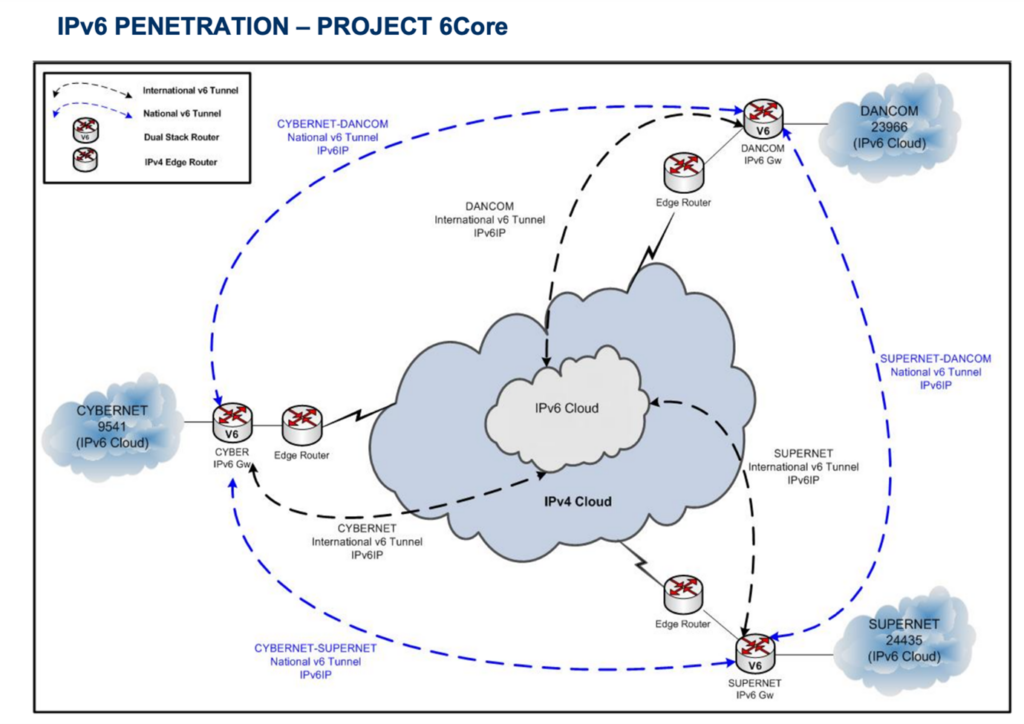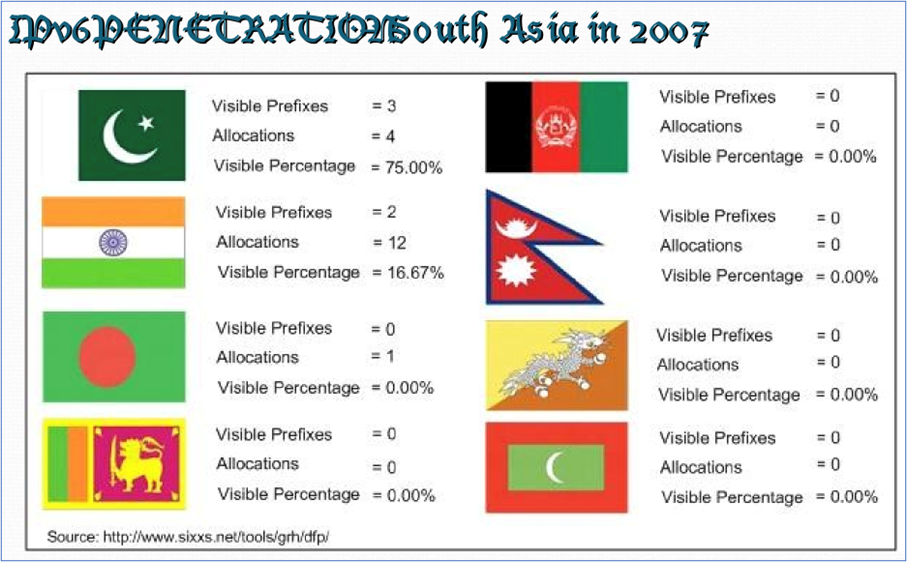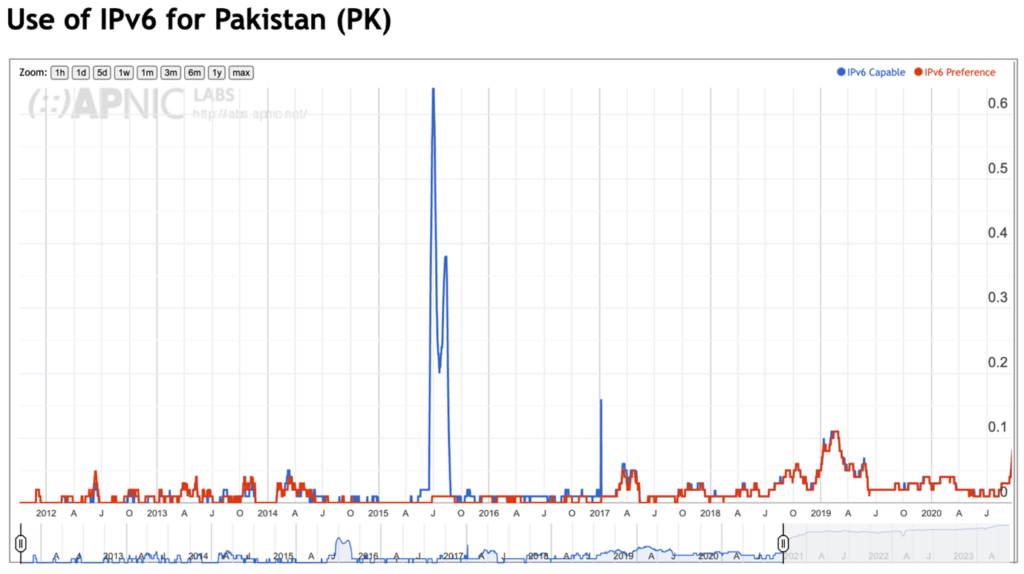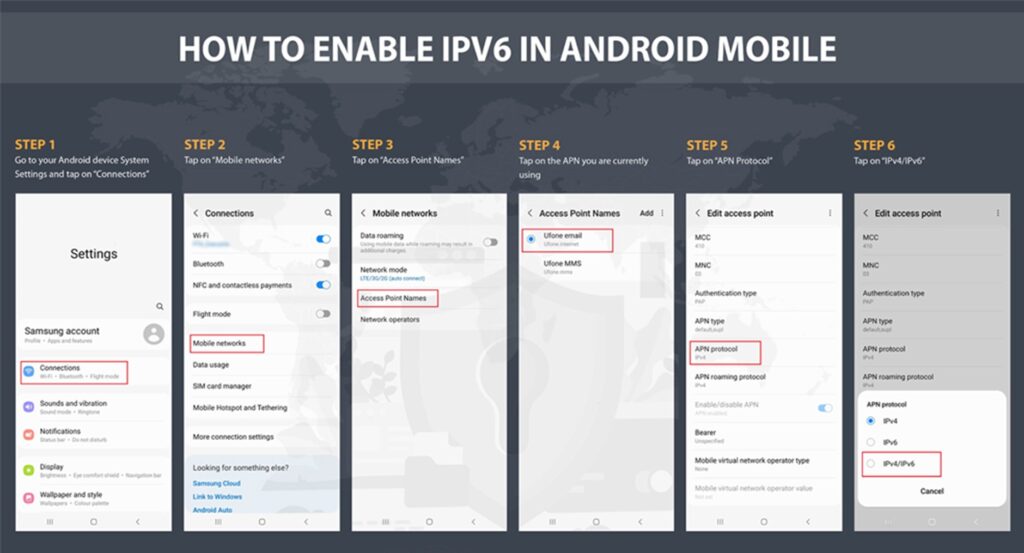
In September 2006, technology enthusiasts from Cyber Internet Services Pvt Ltd (Cybernet) such as Haris Shamsi, Fahad Ali Khan and Asad Ul Islam established the national IPv6 Task Force directly after SANOG 8, the first SANOG held in Pakistan. The IPv6 Task Force (now defunct) was created with the aim of accelerating the adoption and implementation of IPv6 within Pakistan. The primary goal of this task force was to expedite the deployment of IPv6 technology across the economy.
The task force initiated a project named 6Core (Figure 1) with the help and support of Tariq Mustafa (Multinet) and Zaeem Arshad (Dancom), which served as a test bed for IPv6 in Pakistan. This project provided an experimental environment to test and evaluate the functionality, compatibility, and performance of IPv6 networks and services within Pakistan.

At the same time, these three major Internet Service Providers (ISPs), Cybernet, Multinet, and Dancom received their IPv6 delegations from APNIC (Figure 2).

In June 2007, the task force organized and hosted the ‘IPv6 Technical Summit’, a significant event focused on understanding the technological requirements for the successful integration of IPv6.
The establishment of the national IPv6 Task Force, along with its various activities such as hosting technical summits and implementing the 6Core project, demonstrated the commitment of the ISP/telecom sector and relevant stakeholders to promote and facilitate the adoption of IPv6 in Pakistan. These initiatives were aimed at ensuring that Pakistan kept pace with the global transition to IPv6, offering a larger address space and improved capability for the growing number of Internet-connected devices.
All the efforts were in the right direction at that time, for example, this slide deck by Zaeem Arshad from SANOG 13 (January 2009) shows some progress in the South Asian region.

The biggest barrier to IPv6 implementation at the time was the lack of awareness, and ISPs were very reluctant to implement IPv6 due to cost concerns and a lack of technical skills. They feared that implementing IPv6 would require training their staff to install, maintain, and troubleshoot devices and software that support IPv6.
In August 2007, the ICT Cell within the Pakistan Telecommunication Authority (PTA) organized an industrial forum. The purpose of this forum was to address issues related to the transition from IPv4 to IPv6. The forum saw active participation from major stakeholders in the industry, government, and academia.
Recognizing the significance of IPv6, the PTA formed a focus group and incorporated the IPv6 Task Force (Pakistan) as an integral part of it. Furthermore, it was decided that the PTA would release a consultation paper on matters concerning the transition from IPv4 to IPv6. Additionally, the PTA aimed to facilitate the academic community in establishing IPv6 test nodes, recognizing the importance of practical testing and research in the adoption of IPv6 technology. A consultation paper was released later that year (2007) by PTA.
Besides all the efforts, the deployment of IPv6 between 2006 and 2021 was significantly very slow or negligible when compared to other economies in the South Asian region. The primary ‘perceived’ obstacles to widespread adoption were a lack of awareness, concerns about costs, and a shortage of technical expertise among ISPs and network operators.

The pool of unallocated IPv4 was running low. New APNIC Members were receiving a maximum of a /23 (512 IPv4 addresses) and the cost of IPv4 addresses in the open market was increasing dramatically. These factors gave significant reasons for organizations to consider deploying IPv6 and were a triggering point for the regulator to revive the IPv6 deployment plan in Pakistan.
The PTA reignited efforts to encourage its members (telcos and ISPs) to deploy IPv6 in their networks, thanks to the efforts of Mr Ahmed Bakhat – Director of Cybersecurity at PTA.
As part of these renewed efforts, PTA issued notices to all its members urging them to deploy IPv6. By issuing these notices, PTA encouraged ISPs to adopt and implement IPv6 to ensure the continued growth and sustainability of the Internet in Pakistan. They assured ISPs that while the initial investment and effort required to transition to IPv6 may have seemed substantial, it was considered a strategic long-term solution to address the limitations of IPv4 and support the future growth of the Internet.
PTA also issued advisory notifications to Android users to enable IPv6 (Figure 5).

While strict regulatory efforts may not always guarantee desired outcomes and are not usually recommended as a first step, they can play a significant role in driving certain initiatives. In some cases, a push from regulatory bodies can be necessary to create awareness, set standards, and establish a framework for the adoption of new technologies or practices.
In the context of deploying IPv6, the telecom sector regulator issuing notices to ISPs serves as a form of encouragement and reminder to prioritize the transition. By providing a gentle push, the regulatory body can highlight the importance of IPv6 deployment and create a sense of urgency among ISPs.
While a balanced approach is crucial, a moderate level of regulatory intervention can be effective in nudging the industry toward necessary changes. It can create a supportive environment, foster collaboration, and ensure a coordinated effort among ISPs, regulators, and other stakeholders.
In the case of IPv6 deployment in Pakistan, this little nudge is working well (Figure 6).

However, it’s important to consider the specific context and circumstances of each situation. Different regulatory approaches may be required based on the industry, market dynamics, and technological landscape. Flexibility and adaptability in regulatory measures are essential to accommodate the diverse needs and challenges that arise during the transition to IPv6 or any other significant technological shift.
The journey towards widespread IPv6 adoption is indeed a long one, and it requires continuous efforts to ensure progress. It’s important to maintain momentum and not become complacent in the process. The transition from IPv4 to IPv6 involves various stakeholders, including ISPs, regulatory bodies, businesses, and individuals, all working together towards a common goal.
To ensure the successful deployment of IPv6, it’s crucial to continue raising awareness about its benefits and addressing the concerns and challenges that may hinder its adoption. This can involve ongoing educational campaigns, training programs, and technical support to enhance the understanding and capabilities of stakeholders.
Learning from neighbouring economies such as India, Nepal and Sri Lanka can be a valuable approach. Examining the experiences and best practices of others that have made significant progress in adopting IPv6 can provide valuable insights and guidance and a deeper understanding of the factors that contribute to effective IPv6 implementation. This knowledge can help inform decision-making processes, policy formulation, and the development of implementation plans.
Some potential areas to learn from neighbouring economies include:
- Regulatory framework: Analysing the regulatory frameworks and policies implemented by regional neighbours. This may involve studying measures such as mandatory IPv6 compliance, incentives for early adoption, and regulatory support for capacity building and training.
- Awareness and capacity building: Understanding the awareness campaigns, training programs, and capacity-building initiatives undertaken by neighbouring economies can provide insights into effective strategies for raising awareness about IPv6 and necessary skill development for IPv6 implementation.
- Technical implementation: Studying the technical aspects of IPv6 deployment in neighbouring economies can provide practical insights into network design, addressing plans, security considerations, and interoperability. Understanding the approaches taken by successful implementations can help inform technical strategies and minimize potential pitfalls.
It’s important to note that while learning from regional neighbours can be beneficial, it’s also important to consider your own unique context and specific challenges. Tailoring strategies to address the economy’s specific requirements and leveraging the collective knowledge gained from both international experiences and local expertise will be key to successful IPv6 deployment in Pakistan, and elsewhere.
Aftab Siddiqui is a MANRS Project Lead & Senior Manager, Internet Technology at the Internet Society.
The views expressed by the authors of this blog are their own and do not necessarily reflect the views of APNIC. Please note a Code of Conduct applies to this blog.

Research collaboration
I am surprised to know that there is no mention of press release by PTCL on the eve of Global” IPv6 Day on June 8th 2011″ Refer to press clipping here”
https://www.brecorder.com/news/3881127
Can anyone update latest scenario?
Very well explained. Still PK is in need of better planning for adoption of IPv6. First and foremost task is to educate the industry and gadget them with expertise.